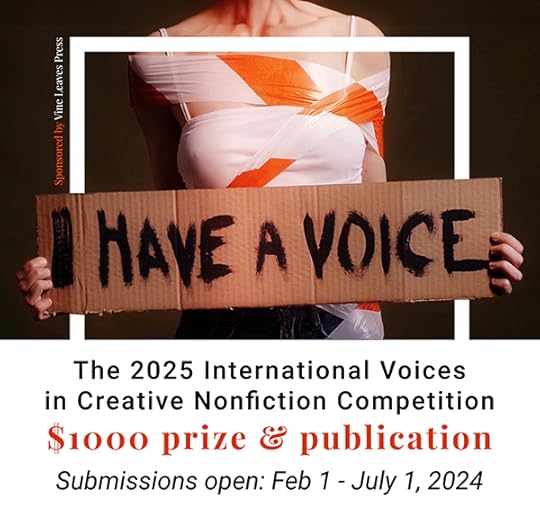In Conversation with Vine Leaves Press
As regular readers of this blog will know, in my last post of each month this year I’m in conversation with an author friend. Well, this month, you’re meeting not one but two of my author friends, Jessica Bell and Amie McCracken, speaking about the small but mighty independent publishing company that they run, Vine Leaves Press.
 Amie is Vine Leaves Press’s publishing director
Amie is Vine Leaves Press’s publishing director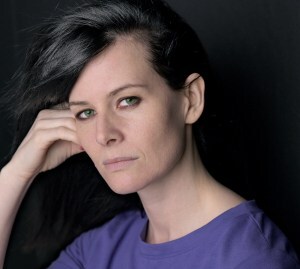 Jessica is Publisher at Vine Leaves Press. (Photo by Giannakakis Tasos)
Jessica is Publisher at Vine Leaves Press. (Photo by Giannakakis Tasos)Years ago, I used to be a reviewer for Vine Leaves Press, so I can vouch from personal experience for the quality and diversity of their books. Jessica and Amie are both multi-talented writers, who have published many of their own books also, and between them they have all of the skills that any publishing company needs:
editing, formatting, design, production, distribution and marketing.
I particularly wanted to share with you the diversity of their books, one of many factors that makes their work stand out from mainstream publishers, who so often pay only lip-service to representation.
At the end of the interview, you’ll find an invitation to submit YOUR manuscript to Vine Leaves’ International Voices competition – but you’ll have to hurry, as the deadline is Monday 1st July!
Debbie: Hi, Jessica and Amie, I’m so pleased to be sharing here with my readers the great work that you do. Vine Leaves Press is renowned as a platform for diverse voices – such an important topic in today’s publishing industry. Please tell us first a little about how VLP came to be, and its history and achievements.
Jessica: Vine Leaves started as a literary journal in 2011. It was a LOT of work to maintain, but we were lucky to have some fabulous volunteers working for us, and so we stayed on our feet until 2017. In 2014, we started the Vine Leaves Vignette Collection Award, and that’s how we published our first book, the winner of the competition, Amanya Maloba, author of Harvest.
So, becoming a book publisher felt like a natural progression from that point. Now we have around 150 backlist books still in print, some of which have won literary awards, and 30 new titles coming out every year.
For the last few years, we have been inundated with submissions every time we open our doors. Last year (2023) we opened to submissions at the end of September, and between then and February 2024, we received over 500 queries, from both authors and literary agents.
We are now closed to general submissions again until October of 2024 so we can catch our breaths, and our publishing schedule is currently full until mid-2026. We’ve just started building our own store now and are hoping to push direct sales through our own website, since only distributing to retailers like Amazon is getting more and more expensive by day and is not very profitable to us as a business, or our authors. Did you hear about SPD closing? The cost of publishing today is hitting businesses hard.
Debbie: We are now such a mobile society and also much more open about different kinds of diversity eg racial, gender, sexuality, neurology. Why is traditional publishing still so straight/white/middle class? What needs to happen for that to change – if indeed it can change?
Amie: So much of this goes back to history and culture—and of course money. The prevailing society in the arts is still the white colonists.
Many industries are experiencing growing pains in diversifying. Publishing is no different, especially because it has predominantly always been a white male centric business.
I have no doubt it will change, as the internet has opened up the world to how many voices actually exist. And I cannot wait to help make this happen. It might be slow, but it is steadily on its way. You can see this in how independent publishing has gained traction in the last few decades. So too will diversity.
Debbie: How is the indie movement – both small indie presses like VLP and indie/self-publishing authors – leading the field in representing diverse voices?
Jessica: I think we’re more willing to take risks. Yes, we need to make money, but we’re not bound by targets that are set by board members, and pigeon holes re genre that are set by the industry so that a book can fit comfortably on a specific shelf in a bookstore. We make our own rules and bend to meet them.
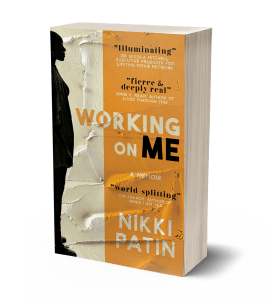 For example, one of our latest releases, called Working on Me, chronicles the dysfunction and lore of a Black Russian Jewish interracial family on the far south side of Chicago, and the resulting trajectory of its prodigal child: multifaceted, multidisciplinary artist, performer, and sexual and domestic violence survivor Nikki Patin. Patin’s prowess as a poet and songwriter is reflected in prose that is brutal, beautiful, and brave.
For example, one of our latest releases, called Working on Me, chronicles the dysfunction and lore of a Black Russian Jewish interracial family on the far south side of Chicago, and the resulting trajectory of its prodigal child: multifaceted, multidisciplinary artist, performer, and sexual and domestic violence survivor Nikki Patin. Patin’s prowess as a poet and songwriter is reflected in prose that is brutal, beautiful, and brave.
At the sight of a submission like that, we get excited. A literary agent would too, I imagine, but then it would hit them that they wouldn’t be able to sell it and have to turn it away.
Debbie: So often authors and publishers pay token gestures to diversity eg making sure there’s one foreign name or one gay character in a book. How do you make sure your books are genuinely representative of true diversity?
Amie: By making sure that the authors we take on have either the personal experience, or have done their due diligence to make sure those voices are properly represented. It is frustrating when topics get shoe-horned in just to meet the quota. Readers aren’t idiots. They know when that’s been done. So we seek authentic voices or make sure that we have sensitivity readers to ensure the facts and emotions are authentic.
Debbie: Authors can submit directly to VLP without an agent – which presumably is another way of increasing diversity, as agents aren’t able to weed any out along the way. What proportion of submissions are from authors who might otherwise struggle to find representation in the traditional publishing sector?
Jessica: Most of our submissions are from authors directly. Probably 90%. The last two or three years has seen an increase in agent submissions.
Debbie: You are way oversubscribed in terms of submissions. How do you choose which books make the cut? Do you consciously choose diverse voices or do they tend to be better submissions because they’re more original?
Jessica: We choose based on whether the author has a unique and authentic voice, whether the subject matter is suitable for our press, and whether the writing is strong.
Diversity comes naturally when that’s what you’re looking for. And it’s clear from the books on our website re what books we want.
That said, we do not exclude work written by white middle-class people about white middle-class people. It’s all about voice and perspective.
Debbie: How can people submit manuscripts to you and what are your top tips for gaining your attention?
Jessica: Our submission guidelines are here: vineleavespress.com/submissions. If you start your query off with one thing that sets your book apart from everyone else’s, then you’ve got our attention.
Debbie: If you could choose a single VLP book that you would love more people to pick up and read, which would it be? Which books representing diverse authors would you recommend to new readers?
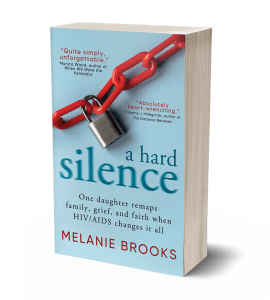 Amie: How can you do this to me? To choose between so many beautiful stories? Goodness. Well, I’m going to bend the rules a bit. There are three memoirs that had me laughing and crying and generally heart-broken in a beautiful way. A Hard Silence by Melanie Brooks, Prepare for Departure by Mark Chesnut, and Were You Close? by Anne Pinkerton.
Amie: How can you do this to me? To choose between so many beautiful stories? Goodness. Well, I’m going to bend the rules a bit. There are three memoirs that had me laughing and crying and generally heart-broken in a beautiful way. A Hard Silence by Melanie Brooks, Prepare for Departure by Mark Chesnut, and Were You Close? by Anne Pinkerton.
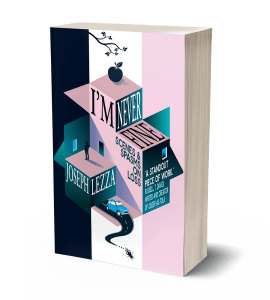 We have a few bestsellers and a few upcoming books that are really hard-hitting. I’m Never Fine by Joseph Lezza is a memoir, an autopsy of perceived missteps, a conclusion to unfinished conversations, and a reframing of flawed judgments through the eyes of a young man in search of a feeling.
We have a few bestsellers and a few upcoming books that are really hard-hitting. I’m Never Fine by Joseph Lezza is a memoir, an autopsy of perceived missteps, a conclusion to unfinished conversations, and a reframing of flawed judgments through the eyes of a young man in search of a feeling.
 Working on Me by Nikki Patin is a memoir that chronicles the dysfunction and lore of a Black Russian Jewish interracial family on the far south side of Chicago.
Working on Me by Nikki Patin is a memoir that chronicles the dysfunction and lore of a Black Russian Jewish interracial family on the far south side of Chicago.
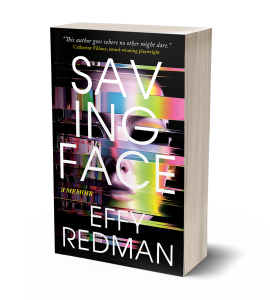 And Saving Face by Effy Redman is a memoir about living with a rare condition of face paralysis. It is a searing personal tribute to anybody who has ever felt like an outsider.
And Saving Face by Effy Redman is a memoir about living with a rare condition of face paralysis. It is a searing personal tribute to anybody who has ever felt like an outsider.
Debbie: What do you find the most rewarding about publishing truly diverse voices?
Jessica: The fact that they are generally overlooked by the mainstream and that we are able to give these authors a real chance at being heard.
Debbie: What’s the best way for readers to get hold of VLP books?
Jessica: Please buy directly from us via the “Our Store” tab on our website: vineleavespress.com. This store is new at the moment, so there are only a few titles there. We are currently getting our back list in order to be available too.
Debbie: When you’re motivated by principles rather than profit, it must be hard work to keep the press going. What’s the best way for readers to support what you are doing, other than by buying VLP books?
Amie: We have always said that the day we don’t have our hands on the production of each and every book that comes through our press is the day we don’t want to be doing it anymore.
Vine Leaves is done out of love and hard work. So that means it would be ever so helpful to have readers share the books they love with their family and friends and even wider across the universe.
We also have an option to donate to Vine Leaves, whether one time or on a subscription basis with the chance to get access to our newest releases. You can do so here: www.vineleavespress.com/donate.html
Debbie: Jessica and Amie, thank you so much for joining me in conversation here today. I’m excited to raise awareness of Vine Leaves Press and the great work you do with my readers, family and friends.
Would you like to write for Vine Leaves Press?If so, here’s a timely competition for you to enter – but hurry, as the closing date is on 1st July 2024!
Click the link below to find out more about the 2025 International Voices in Creative Nonfiction Competition:
https://www.vineleavespress.com/international-voices-in-cnf.html
